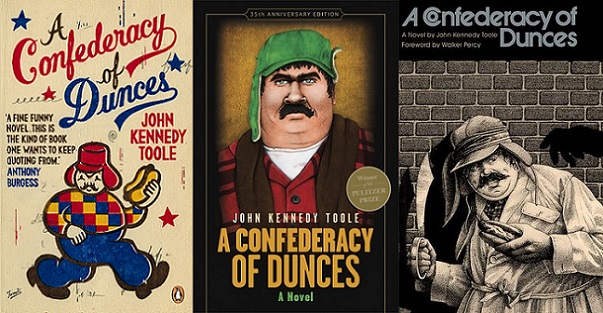John Kennedy Toole of New Orleans, Louisiana died by suicide in Biloxi, Mississippi in March of 1969. With the persistence of his mother, Thelma Toole, and writer Walker Percy, John Kennedy Toole‘s 1981 winner of the Pulitzer Prize for Fiction, A Confederacy of Dunces, was published in 1980.

The title for A Confederacy of Dunces comes from a Jonathan Swift essay titled Thoughts on Various Subjects, Moral and Diverting, wherein recognition of a genius can be noted when “the dunces are all in confederacy against him.” Toole‘s book frames the book’s protagonist, a well-educated yet indolent 30-year-old man that lives at home with his mother, as that genius. Ignatius J. Reilly encounters several interesting and well-drawn characters in the French Quarter of New Orleans of the early 1960’s while looking rather unsuccessfully for work.

Ignatius J. Reilly lives with his mother, Irene Reilly, through the majority of A Confederacy of Dunces. The younger Reilly’s fixed affirmations for theology and geometry lead him into a belligerence towards Irene and most people around him, as expressed interpersonally many times through the book. An early display of this comes when police officer Angelo Mancuso demands that Ignatius produce identification while he waits for his mother to return from a doctor’s visit for her arthritis.

The scene comedically resolves itself with undignified accusations about the city and law enforcement. As Irene and Ignatius use the confusion to make their escape into a bar. As a result of the excessive drinking that follows, the boy and his mother incur a debt brought on by crashing their Plymouth. This provides the avenue for really allowing the full expression of Ignatius J. Reilly to be shown in his adoration for early Medieval philosopher Boethius, among other eccentricities set in opposition to the popular culture of the time.

Ignatius’ enjoyment of eating coupled with eventually landing work as a hot dog vendor lends itself to explicit humor at odds with much of the upstanding ideals that the large gentleman aims to use as mechanisms of self-defense. In addition to more than a dozen characters that interact with Ignatius, his largely written relationship with Jewish beatnik Myrna Minkoff of New York City, New York proves important to anchoring Ignatius J. Reilly to a reality that, through much of the remainder of the novel, can be comedically fleeting and delusional at times.

I have seen A Confederacy of Dunces appear on multiple lists of works of the South in the United States. This, coupled with its recognition by the organization adjudicating books for the Pulitzer Prize, convinced me to have a look. That I found this citation of A Confederacy of Dunces “as probably the perfect New Orleans book” also helped. The book lent itself to an appealing, if sometimes maddening, exploration of the imagination when sticking with some of the ways the social mistakes wound up correcting themselves in the end. I suppose that is where the charm for the book rests. I grant A Confederacy of Dunces as written by John Kennedy Toole 3.75-stars on a scale of 1-to-5 for its quality.
Matt – Saturday, March 19, 2022
